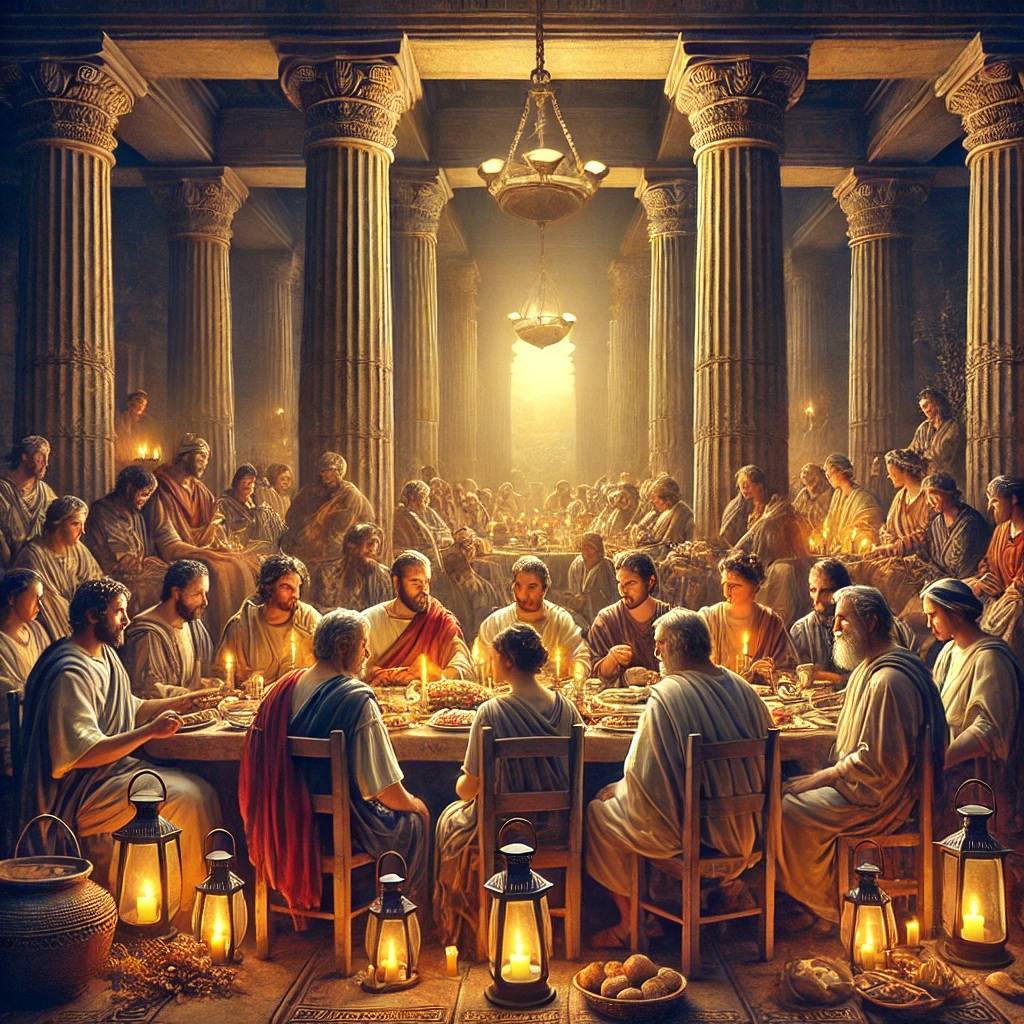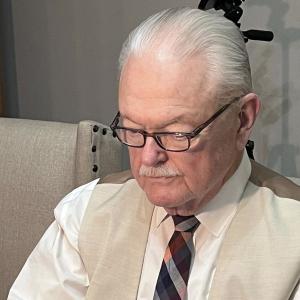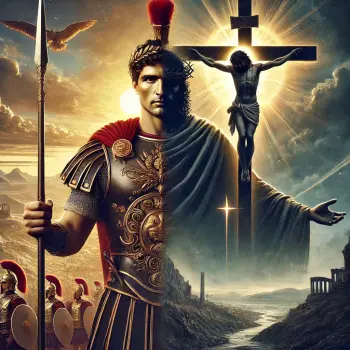
The Corinthian Problem: Divisions Between Two Classes
Seeking to allay a specific & un-Christlike practice in the Corinthian church when writing from Ephesus on his 3rd Missionary Journey, Paul pinpoints the overarching problem by writing, “When you come together as a church, I hear that divisions exist among you” (v. 18). To properly interpret the inspired words of this biblical context through exegesis (lifting the text’s meaning), Christians must focus on the specific reason for the dangerous threat of divisions at Corinth addressed in these verses of I Corinthians 11;17-34 and how these inspired words from God are the spiritual cure for the same in all ages until the end of time in the church.
Exposing of A Root Cause of Divisions
Out-of-Step with Jesus
The sin exposed by Paul in this context was not turning the Lord’s Supper into a drunken feast as many have supposed, but a Greco-Roman culturally driven norm of some Corinthians walking completely out of step with Christ in their weekly LOVE FEASTS, which was inconsistent with the self-sacrifice of Jesus remembered each First Day of the Week in the partaking of the Lord’s Supper (cp. Jude 8-13, esp. v.12; cp. Acts 20:7).
Creative Discriminations at the Love Feasts
As congregations today usually have periodic fellowship dinners, the early church conducted weekly fellowship dinners as a part of their entire day of worship and fellowship. The divisions in the congregation at Corinth were being sharply manifested at these weekly love feasts (cp. Jude 12) when the Christian slave owners took deliberate measures to avoid eating and sharing their food with the Christian slaves who were a part of the same spiritual church family, but, oftentimes, who arrived late after their day’s mandatory slave work.
This was a clear case of wickedly dragging the Roman cultural biases into Christianity—whether at the assemblies and on into everyday life. Today’s applications for the church are just as applicable as when the Corinthian divisions were afoot over 2100 years ago. Satan is seeking to use any and every path to divide Christians.
When in Rome: Do Not Do As The Romans Do
Only Motive: Protecting Their Investment
The Roman Empire conquered and enslaved many nations of the earth creating 60,000,000 slaves who were, generally, viewed by the slave owners as pieces of property like axes, plows, or farm animals. Masters had the power of life and death over slaves with no concern of reprisals from the governing powers. Thus, the only dynamic tempering severity with slaves from the slave owners’ perspectives was to protect their resale value.
Sit in the Back of the Bus
Sound familiar? Such 20th Century racial discrimination of segregated water coolers, bathrooms, and even back seats on buses were in strong evidence slavery system of the deep South. But, such was nothing new.
Greco-Roman Classes
In a Greco-Roman household, there were three classes: (1) the master and his family; (2) free servants; and, (3) slaves. At mealtime, the master and his family would recline for their meal eating and drinking the finest of foods and drinks brought in by the servants. Servants did not eat until the master’s family was finished. Slaves got the scraps very much like many feed their dogs. Hence, it would have been unthinkable and revolutionary for a slave to walk into the master’s house at mealtime and sit down with the family to dine. Such would have led to the severest of treatments, including execution.
Culture or Christ
Gross Failures to Realize Spiritual Ramifications of Christianity
When Paul brought the gospel of Jesus to Corinth on his 2nd Journey, many masters and multitudes of slaves became Christians. Hence, when the weekly love feasts were held at church assemblies, Christian masters at Corinth arrived before the slaves finished their work to join the dinner and were gorging themselves on all the good foods they brought intentionally leaving nothing for the slaves who came later. That is the biblical framework that moved the Holy Spirit of God for Paul to write, “Therefore when you come together it is not to eat the Lord’s Supper, for when you eat, each one takes his own supper first, and one goes hungry while another gets drunk (gluttonous) or do you despise the church of God and shame those who have nothing” (vs. 20-22). Why was it that the selfish Christian masters were not, in effect, eating the Lord’s Supper as far as God was concerned? They were, indeed, partaking of the unleavened bread and the fruit of the vine, but were TOTALLY OUT OF STEP with what the Lord’s Supper represented in their weekly love feasts!
Do This in Remembrance of Me: Vertically & Horizontally
In that biblical framework and context, Paul wrote, “For I received from the Lord that which I also delivered to you, that the Lord Jesus, on the night when He was betrayed, took bread; and when He had given thanks, He broke it and said, ‘This is My body, which is for you; do this in remembrance of Me.’ In the same way, He also took the cup after supper, saying, ‘This cup is the new covenant in My blood; do this, as often as you drink it, in remembrance of Me.’ For as often as you eat this bread and drink the cup, you proclaim the Lord’s death until He comes” (vs. 23-26).
The Lord’s Supper is a time of self-examination as the Christian vertically remembers Christ’s death for all mankind and horizontally how His sacrifice is to impact and change our lives!
A Time of Recalibration of Fellowship
Why Bring Up the Lord’s Supper When Addressing Divisions?
Specifically, why did Paul interject the illustration of Jesus’ institution of the Lord’s Supper and Christians’ practice of partaking of the same each First Day of the Week into the greater context of I Corinthians 11:17-34 that was specifically styled to address the divisions between Christian masters and Christian slaves manifesting the vast social chasm between those two opposite cultural and social class poles?
Cause and Effect
The answer rests in CAUSE & EFFECT. The EFFECT of commanded unity being sought by God through Paul’s inspired words could (can) only be empowered by the CAUSE of the life-changing impact of the self-sacrifice of Christ for all mankind. Jesus’ death for the sins of all humanity must impact each Christian regardless of former divisions, understood customs, or cultural biases. No person saved by Christ can emerge unchanged!
It is Not the Lord’s Supper You Eat!
The divine aim of God through Paul was the dissolving of the Corinthian divisions being created by Christian slave owners wickedly treating Christian slaves with anything other than the equality of love, brotherhood, and communion (fellowship). This self-sacrifice of Jesus was (is) memorialized each First Day of the Week in the Lord’s Supper! When Paul said, “It is not the Lord’s Supper you eat,” he was pointing to the gross inconsistency of partaking of the unleavened bread to remember the broken body of Jesus on the cross and drinking of the cup remembering the shedding of His blood on the cross for all and, yet, treating your fellow Christian like dirt before and after the weekly Lord’s Supper is over! In effect, failure to connect what Jesus did at Calvary with how we are to treat fellow Christians regardless of gender, age, or class renders us NOT remembering the Lord’s death until He comes!
Turning The Roman World Upside Down
Challenging the Social and Cultural Order
The pressures on Christian slave owners would have been culturally enormous! One of the foundations of the Roman economic system was the institution of slavery. For a Christian master to act as brothers in Christ with Christian slaves, literally, challenged the social order of those still in spiritual darkness. Christianity did, indeed, turn the world upside down (cp. Acts 17:6)!
Think Your Way into a Better Way of Acting
These dynamics were showcased and tested when Paul wrote from his first Roman Imprisonment to a brother in Christ in the Lycos Valley–a slave owner named, Philemon. A non-Christian slave, Onesimus, had run away from his master, Philemon, and, through the providence of God, had ended up in contact with Paul during his two-year house arrest in Rome. As a result of that meeting, Onesimus believed in and surrendered to Christ becoming a brother in Christ to Paul, and, yes, to Philemon, his master, as well.
In one of the most persuasive letters written by Paul, he employs an array of spiritual persuasions directed to Philemon to be lenient with his returning slave underscoring God’s providence and the bonds of Christian brotherhood. Paul writes, “For perhaps it was for this reason that he was separated from you for a while, that you would have him back forever, no longer as a slave, but more than a beloved brother, especially to me, but how much more to you, both in the flesh and in the Lord” (Philemon 15, 16).
A Time of Self-Examination and Change
Partaking in an Unworthy Manner Leads to Spiritual Illness
Hence, Paul admonishes the Corinthian slave owners, “Therefore whoever eats the bread or drinks the cup of the Lord in an unworthy way (meaning not treating fellow Christians in any way other than equal brothers in Christ), shall be guilty of the body and the blood of the Lord (such divisions are out of step with the sacrifice of Jesus for all)…For the one who eats and drinks, eats and drinks judgment to himself if he does not properly recognize the body (fellow Christians in the church). For this reason, many among you are weak and sick, and a number are asleep (meaning favoritism and discrimination led (leads) to spiritual weakness, sickness, and death–separation from God).
Inviting Divine Chastisement
Paul directs that Christians (regardless of gender, race, socio-economic levels, or, education) are to “judge ourselves rightly, (so) we (will) not be judged. But when we are judged, we are disciplined by the Lord (meaning failure to treat brothers as beloved as equals invites the chastisement of God) so that we will not be condemned along with the world” (vs. 27-32).
Act Your Way into a Better Way of Thinking
God’s immediate solution to the Corinthian divisions was, “So then, my brothers and sisters when you come together to eat, wait for one another” (meaning to wait until the Christian slaves arrive and can share in the meal with you as brothers and sisters) (v. 33). One’s upbringing and cultural norms are characteristically so embedded in our thinking and lifestyles that turning all those past perspectives is tantamount to turning an aircraft carrier on a dime! Yet, our greatest hope of change is the Christians’ weekly revisiting and proper reflection on the scene of our Savior’s body that was broken and His blood that was shed to save us all.
How do we view others of different races, cultures, nations, socio-economic standings, and the like? The Lord’s Supper is a time to recalibrate our hearts weekly and conduct ourselves to discern the Lord’s body (the church—all the saved). Satan divides, but Christ unifies!
Let us Do This in Remembrance of Jesus














